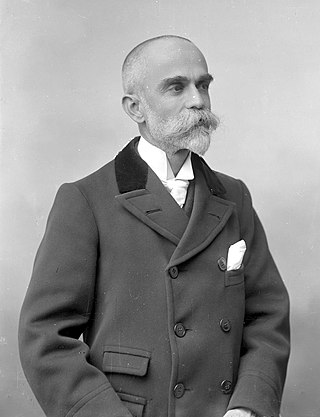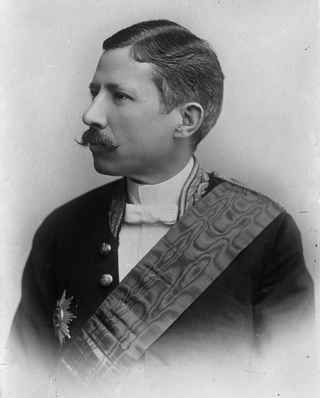
Angola, officially the Republic of Angola, is a country on the west-central coast of Southern Africa. It is the second-largest Lusophone (Portuguese-speaking) country in both total area and population and is the seventh-largest country in Africa. It is bordered by Namibia to the south, the Democratic Republic of the Congo to the north, Zambia to the east, and the Atlantic Ocean to the west. Angola has an exclave province, the province of Cabinda, that borders the Republic of the Congo and the Democratic Republic of the Congo. The capital and most populous city is Luanda.
Regeneration may refer to:
The history of Portugal can be traced from circa 400,000 years ago, when the region of present-day Portugal was inhabited by Homo heidelbergensis.

Bernardino Luís Machado Guimarães, GCTE, GCL, was a Portuguese political figure, the third and eighth president of Portugal.
Since the beginning of liberalism in Portugal in the 19th century, several parties have, by gaining representation in parliament, continued the liberal ideology in contemporary Portuguese politics. But after the initial fervor of the Liberal Revolution of 1820 and the outcome of the Liberal Wars (1828–1834) during the 19th century, liberalism was relegated to a secondary role in Portuguese politics and government and even outlawed for periods of time. The first fully-fledged liberal party founded as such to have a seat in the Portuguese Parliament since the end of the First Portuguese Republic (1910–1926), was the Liberal Initiative, in 2019.

Iberism, also known as pan-Iberism or Iberian federalism, is the pan-nationalist ideology supporting a unification of all the territories of the Iberian Peninsula. It mostly encompasses Andorra, Portugal and Spain, but may also include: Gibraltar and territories of France such as Northern Catalonia or the French Basque Country.
Falangism was the political ideology of two political parties in Spain that were known as the Falange, namely first the Falange Española de las Juntas de Ofensiva Nacional Sindicalista and afterwards the Falange Española Tradicionalista y de las Juntas de Ofensiva Nacional Sindicalista. Falangism has a disputed relationship with fascism as some historians consider the Falange to be a fascist movement based on its fascist leanings during the early years, while others focus on its transformation into an authoritarian conservative political movement in Francoist Spain.
A big tent party, or catch-all party, is a term used in reference to a political party having members covering a broad spectrum of beliefs. This is in contrast to other kinds of parties, which defend a determined ideology, seek voters who adhere to that ideology, and attempt to convince people towards it.

João Franco Ferreira Pinto Castelo-Branco, GCTE was a Portuguese politician, minister, 43rd Minister for Treasury Affairs and 47th Prime Minister.

The First Portuguese Republic spans a complex 16-year period in the history of Portugal, between the end of the period of constitutional monarchy marked by the 5 October 1910 revolution and the 28 May 1926 coup d'état. The latter movement instituted a military dictatorship known as Ditadura Nacional that would be followed by the corporatist Estado Novo regime of António de Oliveira Salazar.

The Kingdom of Portugal under the House of Braganza was a constitutional monarchy from the end of the Liberal Civil War in 1834 to the Republican Revolution of 1910. The initial turmoil of coups d'état perpetrated by the victorious generals of the Civil War was followed by an unstable parliamentary system of governmental "rotation" marked by the growth of the Portuguese Republican Party. This was caused mainly by the inefficiency of the monarchic governments as well as the monarchs' apparent lack of interest in governing the country, aggravated by the British ultimatum for the abandonment of the Portuguese "pink map" project that united Portuguese West Africa and Portuguese East Africa.

Murça is a municipality in northern Portugal. The population in 2011 was 5,952, in an area of 189.37 km2. It is situated in the central part of the eastern district of Vila Real, and consigned to the Trás-os-Montes e Alto Douro region. The town of Murça, seat of the municipal government, is on average 40 kilometres from many of the major urban centres of the region.

The Kingdom of Portugal was a monarchy in the western Iberian Peninsula and the predecessor of the modern Portuguese Republic. Existing to various extents between 1139 and 1910, it was also known as the Kingdom of Portugal and the Algarves after 1415, and as the United Kingdom of Portugal, Brazil and the Algarves between 1815 and 1822. The name is also often applied to the Portuguese Empire, the realm's overseas colonies.

The Liberal Revolution of 1820 was a Portuguese political revolution that erupted in 1820. It began with a military insurrection in the city of Porto, in northern Portugal, that quickly and peacefully spread to the rest of the country. The Revolution resulted in the return in 1821 of the Portuguese court to Portugal from Brazil, where it had fled during the Peninsular War, and initiated a constitutional period in which the 1822 Constitution was ratified and implemented. The movement's liberal ideas had an important influence on Portuguese society and political organization in the nineteenth century.
The Progressive Party, along with their opponent the Partido Regenerador, was a political party in Portugal during the constitutional monarchy at the end of the 19th century.

The Lisbon Regicide or Regicide of 1908 was the assassination of King Carlos I of Portugal and the Algarves and his heir-apparent, Luís Filipe, Prince Royal of Portugal, by assassins sympathetic to Republican interests and aided by elements within the Portuguese Carbonária, disenchanted politicians and anti-monarchists. The events occurred on 1 February 1908 at the Square of Commerce along the banks of the Tagus River in Lisbon, commonly referred to by its antiquated name Terreiro do Paço.

The Municipal Library Elevator Coup, also known as The Elevator Coup or 28 January 1908 Coup, was the name given for the attempted coup d'état in Lisbon, capital of Portugal, by members of the Portuguese Republican Party and Progressive Dissidency against the administrative dictatorship of Prime Minister João Franco. The event was not confined to the Municipal Library Elevator, but was so named for the arrest of many conspirators at the structure on the afternoon of 28 January 1908. Although the coup was prevented by government forces, it failed to capture all the conspirators, which contributed to the assassination of the monarch Carlos I of Portugal and the heir to the throne, the Prince Royal, Luís Filipe. These events would continue legislative instability and lead to the Portuguese First Republic, the raison d'être of the coup conspirators.
The Liberal Regenerator Party was a Portuguese political party established in 1901, under the leadership of João Franco. The party was asked to form a government by King Carlos I in 1906, and its leader ultimately accused of being partly responsible for the assassination of the King in 1908, for the policies he enacted during its tenure.









